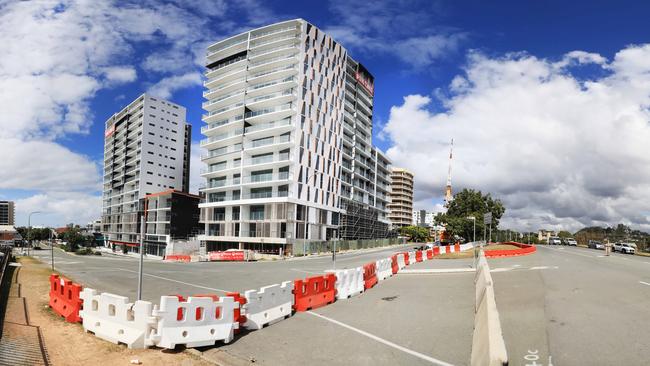It’s the pandemic, stupid — keep those borders shut
As the citizens of Melbourne know, lockdown restrictions are frustrating — but they are also reassuring.

So, by extension, I trust its medical personnel. Consequently, I (and I suspect many others) am pretty sick and tired of the unrelenting, arrogant, anti-border-closure commentary coming from dry economists, business owners and many other do-it-yourself epidemiologists. I loosely call this the let-it-rip school of thought.
Not only are the sceptics telling us that we will all be ruined if we don’t just open up now, but they have more recently come up with pandemic statistics of their own to support their views — everything from how wonderfully Sweden is doing (it is not) to the pointless fact that every flu epidemic since 1700 has died out — presumably because so many people did. A case in point was the last great pandemic of 1919.
The view that has some merit is that, if our internal borders remain closed for much longer, the decline in our economy will have as bad an effect on our health, both physical and mental, as the virus itself. However, on this point alone even some economists are dubious, and they don’t think that lockdown measures and other non-medical interventions such as slow-staged opening and distancing precautions have any worsening economic effects than the pandemic itself.
A paper published in June from the Massachusetts Institute of Technology was written by economists from the Federal Reserve board, the Federal Reserve Bank of New York and the Sloan School of Management at MIT. The paper studies historical evidence from major US cities during the flu pandemic of 1919 to find out whether there were any worse economic outcomes in cities that had early and stringent non-pharmaceutical interventions (NPIs), such as lockdowns and strict social distancing, than in cities that had less stringent social controls.
The results are surprising. Their findings clearly show that during the Spanish flu pandemic the medical and health fallout from the virus itself was far more influential on the economic prospects of multiple US cities when compared with the impact of public health measures.

This implies that losing control of the virus — and anti-lockdown views — are ultimately far more damaging to public confidence, morale and consequently economic recovery, than the public health measures. They found that although the initial effects of the pandemic and associated lockdowns had a marked sudden effect on the US economy, in the “medium run” NPIs were associated with better economic outcomes. In short, NPIs reduce disease transmission without necessarily further depressing economic activity.
Their conclusions are based on a combination of empirical analysis and historical documented evidence, looking at variation in speed and intensity of the implementation of NPIs across US cities at the outbreak in 1918 which resemble policies used to reduce the spread of COVID-19. These include such measures as school, theatre and church closures, public gathering bans, quarantine of suspected cases and restricted business hours.
They find that NPIs achieved substantial reductions in peak mortality and, in cities that went aggressively into pandemic measures, a reduction in cumulative mortality of at least 20 per cent. Thus, these measures were successful, potentially mitigating the “overshoot” in a second wave.
Economic activity was also reduced in the absences of NPIs as households reduced consumption and firms cut investment. However, another finding by the MIT economists is even more applicable to the current climate. There were better economic results from cities with strong NPIs even in the second phase of the pandemic, and particularly as the pandemic waned.
This is because fear of the pandemic itself, fear of infection, starts to decline more rapidly in cities that had stronger initial responses and fewer cases. So, while the initial direct effect of NPIs is to lower economic activity, as time goes on and infection rates lower, economic activity actually increases with improved confidence.
If one wants any evidence of this in the current pandemic, one only has to look at Sweden. Not only has Sweden, with half Australia’s population, suffered more than 10 times our death rate, its economic situation is worse than ours. Its economy has contracted by 8.6 per cent, and economically, as well as medically, it is doing much worse than its neighbours Norway and Denmark, where spending has recovered faster. Interestingly, the only other country with as high rates of trust in government as Australia is Denmark.
The MIT paper illustrates the main reason why more than 80 per cent of Australians are in favour of maintaining current border controls, both international and across states. Ordinary Australians are focused primarily on their health, and the health of their families. This is another verification of the conclusions of the MIT group. It is the pandemic, stupid — not just the economy. Security of health actually outweighs economic security. Australians are focused on health security, which is why people feel safer with closed borders.
We all know that the current lockdown in Victoria was the fault of the Victorian government. It employed the wrong people and allowed quarantine areas to be breached, and listened to bureaucrats rather than the health people — a caution for people inclined to ignore epidemiologists.
But turning this into a political campaign is pointless and cynical. Yes, lockdown restrictions are frustrating — especially if you or your kids are out of work — but they are also reassuring. Because, as the citizens of Melbourne know, eventually it works. As for the let-it-rip school, doubtless its members won’t bother being vaccinated. It will burn itself out, won’t it?




I am not an economist. I was trained in history, so I have not entered into the mysteries of that quite recently formed cabal. I am just an ordinary member of the Australian polity who, according to Pew Research, like 95 per cent of my fellow citizens, trusts the government.